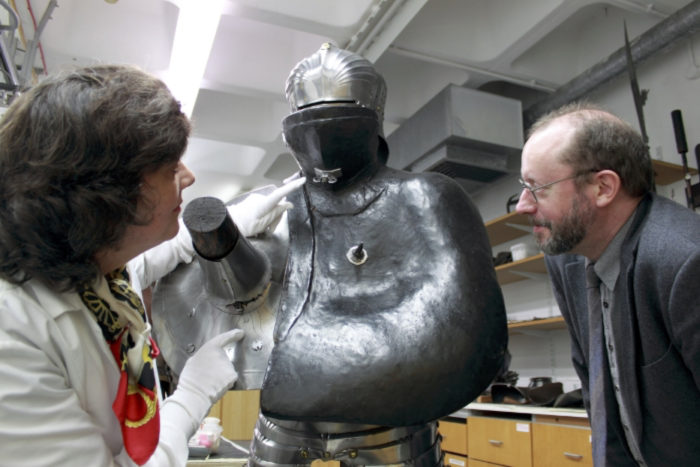Moving forward: 2011 to now
In 2011, the Institute for Medieval Studies (IMS) was incorporated into the School of History, to ensure its organisational stability and growth. Since then the Institute has maintained large and successful cohorts of MA and PhD students. We have developed a range of attractive internships within the IMS to foster the transferable skills of our postgraduates.

Karen Watts, Curator Emeritus at the Royal Armouries, and Alan Murray, Senior Lecturer in Medieval Studies and Editorial Director of the International Medieval Bibliography.
We have utilised the holdings of heritage organisations around Leeds for collaborative projects.
We have built on our links with the Royal Armouries, becoming a key centre for the study of the material culture of arms and armour. We have also worked collaboratively with Leeds Museums and Galleries to further understanding of the archaeological remains of medieval monasticism.
We have also capitalised on the extensive holdings of the Brotherton Library, including the Ripon Cathedral Archives, the early book collection, and the archives of the Yorkshire Archaeological and Historical Society.
Where next?
Increasingly, our focus is on student-led and student-focused projects. We have had great success communicating our cutting-edge research to the public at the Wellcome Trust-funded ‘You Are What You Ate’ events, Light Night, and the ‘Bodies Ignored/Bodies Obsessed’ events.
We continue our long tradition of successful postgraduate conferences, attracting scholars from around the world on topics including monasticism, the culture of war, the medieval Mediterranean, gender, body, and animal studies.
The Leeds University Union Medieval Society was created in 2013 by Rose Sawyer, a PhD student in Medieval Studies, and has organised varied programmes of events, excursions, workshops, and film screenings often in collaboration with Medieval Group and the International Medieval Congress (IMC).
The IMB has linked up with the Bibliographie de civilisation médiévale (University of Poitiers) and the International Bibliography of Humanism and the Renaissance (Thessaloniki).
In 2017, the IMS formalised links with the Centre d’études supérieures de civilisation médiévale at the University of Poitiers, signing an Erasmus+ treaty to promote staff and student exchanges between both institutions.
Looking towards the future, we will develop new international relationships, build on existing White Rose collaborations, and engage further with the wider community. The supportive nature of our postgraduate community will remain central to our approach to teaching and research training in Medieval Studies.
